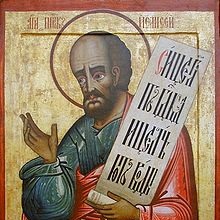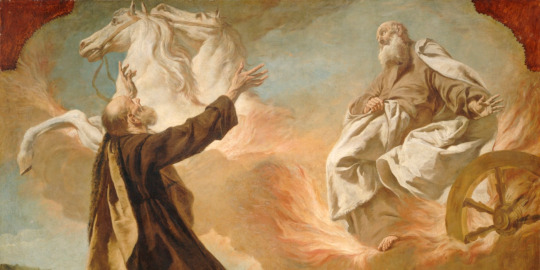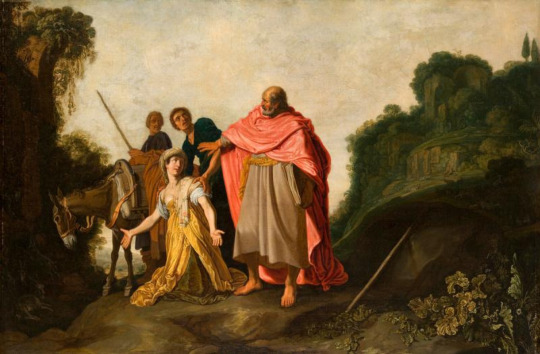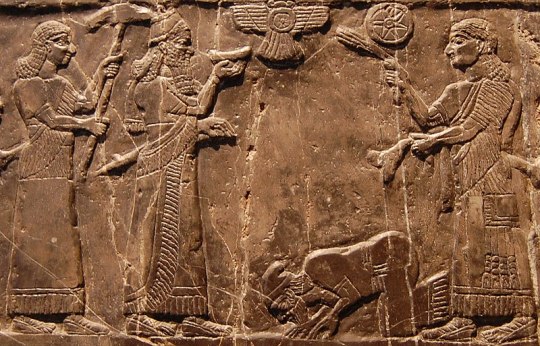#elisha the prophet
Explore tagged Tumblr posts
Text
BALD GUY FIGHT MEGA TOURNAMENT ROUND 1


See all mega tournament polls here
Reasoning under cut
Elisha the Prophet
Funniest part of the bible fr so: Once some guys were mocking Elisha for being bald so he cursed them and then bears came out of the woods and mauled the guys to death (2 Kings 2:23-24)
because it’d be funny
Lady Cassandra
One big ol slab of face on skin. MOISTERISE ME
#bald guy fight mega tournament#bgfmt round 1#elisha the prophet#the bible#lady cassandra#doctor who#polls
83 notes
·
View notes
Text

There are three types of prophets…
#cant win them all#cynicism#doomsday prophets#elijah the prophet#elisha the prophet#john the baptist#artists on tumblr#pencil sketch#my draws#bible#god#jesus humor#repent#kingdomofgod#humor#funny#humour#comedy#meme
6 notes
·
View notes
Photo

THE DESCRIPTION OF SAINT ELISHA THE PROPHET The Successor of of the Prophet Elijah Feast Day: June 14
"Let me inherit a double portion of your spirit." -2 Kings 2:9
A Carmelite and a prophet.
Elisha was a prophet in the northern kingdom of Israel in the 800s BC. His moment of calling was rather mystical: Elisha was plowing a field with twelve yoke of oxen when his predecessor, Elijah, came along and placed his mantle over Elisha's shoulders―a symbol of a call to share in prophetic work. Elisha requested time to say farewell to his parents and then slew the oxen, gave the meat to the people, and joined Elijah.
Chapters 2 to 9 in 2 Kings hold the bulk of the many extraordinary stories surrounding Elisha. After a miraculous crossing of the Jordan River, Elisha watched in amazement as Elijah was suddenly taken to heaven on a fiery chariot. Elisha then took Elijah's cloak and repeated the miracle Elijah had just displayed of striking the cloak upon the water, causing the river to split open.
Also included in these chapters are many other mystical accounts that demonstrate how powerfully the spirit of God was with Elisha: he cleansed bad waters in Jericho, miraculously provided water to Israelite soldiers suffering from dire thirst, inexplicably procured oil for a poor widow, purified poisoned stew, squelched attacks, predicted future events, and more.
One of Elisha's more popular marvels involves a military commander from the kingdom of Aram named Naaman. Naaman suffered from leprosy and heard of Elisha's powers. The commander went to the prophet and was stunned that Elisha told him to wash seven times in the Jordan River, for Naaman felt that other rivers had purer waters. Reluctantly, after some urging from his servants, the commander did as he was told and was completely healed.
Astonishingly, yet another miraculous event surrounding Elisha occurred shortly after his death. A man had died, and while his friends were burying him, they noticed a raiding band heading their way. They quickly tossed the man’s dead body into the grave of Elisha, whereupon the man promptly returned to life.
The Carmelite Order, mindful of its origin on Mount Carmel, with the liturgical celebration of the great Prophets Elijah and Elisha, intends to perpetuate the memory of their presence and of their works. This is why in the year 1399, the Carmelite General Chapter decreed the celebration of the feast of Saint Elisha. In our time, the Prophet gives effective witness of the prophetic charism by means of fidelity to the true God and the service to his people.
Source: National Catholic Register and Province of St. Titus Brandsma of the Philippines (carmelitesph.org)
1 note
·
View note
Text
When the prophet Elijah faced a government that wanted him dead, he wanted to die, so God sent an angel—a messenger of the Lord—who put their hands on him, brought him food and said “Arise, eat.”
And when Elijah laid back down because he lacked the strength to continue, the angel came again. They put their hands on him, brought him food and said “Arise, eat, because the journey is too great for you.”
And Elijah got up and ate. Until he was ready to engage in his long journey to the mountain of God.
When he got there, the government still wanted the prophet dead, so Elijah still wanted to die. So God told him to stand on the mountain while He came by, so that Elijah could be near God and see Him.
Elijah looked for God in the roaring wind, but God was not there. He looked for God in the earthquake, but God was not there. He looked for God in fire, but God was not there.
And then Elijah heard a gentle breeze, and God was there. In comfort. In stillness. In gentleness.
And when Elijah left, still despairing over facing a government that wanted him dead, God sent him to Damascus with the promise that Elijah would anoint new kings and a new prophet. He found Elisha, his companion and fellow prophet, who stood with Elijah as they weathered the storm of government, grief and fear together. And then they built a new world.
Elijah outlived those who wanted him dead. But he did not do it alone. Comfort, touch, food—these are the essentials. These get us out of bed. These keep us alive. The message from God when Elijah is lying down in despair isn’t “get to work,” it isn’t “focus on resisting,” it isn’t “mourn,” it isn’t chastisement. It’s “arise, eat.”
Communion, gentleness, stillness, focus—these are what motivate us to do the work. Elijah was driven by despair into God’s arms. Maybe that works for you—I will be spending my day in prayer alongside my local parish and participating in a communal Mincha service. Maybe the communion and gentleness for you is other people. Your friends, family, loved ones. Maybe it’s yourself—sitting in meditation, art, music, screaming, cooking, sobbing, stretching, gardening. Do something to be in communion with someone or something today. If you have no one, commune with yourself. Commune with plants and your pets and the wind and the water and the candlelight and anywhere you feel that gentle breeze. Stillness, focus, connection.
Finally, companionship, organizing, community, action, solidarity—these are what allow us to do the work. The journey is too great for us alone. We need each other. We will weather this storm together. We will weather the grief and mourning and despair and anger and outrage and whatever the next few years have in store for us, and we will do it standing alongside each other.
Remember—if things get overwhelming, return to the basics. Lay down. Eat. Rest. Repeat until you can find communion and stillness. And repeat both until you can find the strength to journey on and create meaningful relationships and resistance with others.
As final thoughts, I will share the prayer I have prayed regularly since I began my own journey alongside God as a blessing to anyone who may benefit from hearing it:
May God give you eyes that you may see, ears that you may hear, and lips that speak the truth in righteousness. May you receive a caring heart and open mind. May the Lord bless the work of your hands and that which you give others.
And, to those for whom Christ may be a comfort:
May the Risen Savior grant you peace. May He help you to become more like Him and find solace in Him and His Passion. May the five wounds of Christ serve as a map guiding you to His gentle breeze.
May the Holy Virgin light your way and intercede for us all, comfort the afflicted, hear our sorrows, and show us the Blessed Fruit of her womb Jesus.
Em nome do Pai, do Filho, e do Espírito Santo,
Amém.
EDIT: This post is blowing up a bit so I feel the need to expressly state (as if my blog isn’t statement enough) that this is a queer leftist message. I stand with Palestine, Sudan, the Congo and all peoples struggling to be free. I stand with Black, Brown and Indigenous peoples suffering under colonialism, racism and imperialism, I stand with queer people, I stand with the houseless, I stand with anarchists and witches and freedom fighters. The idea of self care expressed here is explicitly indebted to Audre Lorde—the act of placing boundaries with yourself in order to have the energy to do the work of fighting for liberation, freedom and equality. Her concept applied to the labor regularly performed by Black women in being forced to advocate for their own humanity, which ought to be acknowledged, but in its principles we may also find a path to guide the rest of us towards a foundation of sustainable movement. My faith is based around the acknowledgment that Jesus Christ did not come to establish a kingdom of man, or a hierarchy of oppression, but a kingdom of God built for the oppressed.
#hodu la-adonai ki-tov#give thanks to the lord for he is good because his mercy endures forever#catholicism#catholic saints#mary mother of god#catholic#mary mother of jesus#virgin mary#folk catholicism#jesus christ#folk practitioner#the prophet Elijah#elijah#elijah of god#elisha#us elections#catholic leftist#queer catholic#queer christian
119 notes
·
View notes
Text

The Miracles of Prophet Elisha
Artist: Giorgio Vasari (Italian, 1511-1574)
Date: c. 1566
Medium: Oil on Wood
Collection: Galleria degli Uffizi, Florence
Description
This composition is a typical example of a painting for private worship, a genre that was popular with Vasari. The subject is a scene from the life of the Prophet Elisha, who during famine saved his people making edible wild herbs. Elisha is one of the biblical prophets whose miracles prefigured those of Christ. A man in the middle ground carries a basket, because Elisha miraculously multiplied the available food.
In spite of the modest size of the work, the artist insists on elaborating a composition of great complexity and refinement, characteristics which would reappear in the profane paintings of the Studiolo executed thirty years later.
Death in the Pot | 2 Kings 4: 38-41, NIV
Elisha returned to Gilgal and there was a famine in that region. While the company of the prophets was meeting with him, he said to his servant, “Put on the large pot and cook some stew for these prophets.”
One of them went out into the fields to gather herbs and found a wild vine and picked as many of its gourds as his garment could hold. When he returned, he cut them up into the pot of stew, though no one knew what they were. The stew was poured out for the men, but as they began to eat it, they cried out, “Man of God, there is death in the pot!” And they could not eat it.
Elisha said, “Get some flour.” He put it into the pot and said, “Serve it to the people to eat.” And there was nothing harmful in the pot.
#painting#prophet elisha#christianity#old testament#giorgio vasari#holy bible#bible story#oil on wood#bible miracles#faine#food#israel#men#distant landscape#steps#italian painter#european art#table#pots#stew#book of 2 kings#christian art
36 notes
·
View notes
Text

1 note
·
View note
Text
Passion is Good; What About Getting a Double Portion of Passion?
Vincent Van Gogh said, “I would rather die of passion than of boredom.” The Britannica Dictionary ( https://www.britannica.com/dictionary/passion ) defines passion as “a strong feeling of enthusiasm or excitement for something or about doing something”. Passion is something all of us experience from time to time, and it can be everything from a strong emotion to a driving force in our lives.…
0 notes
Text
Modern day people will be like "I'm Prophet Josiah" and I'm just like "Cool, cool. So can I buy your poetry at Books-A-Million or???"
#stop calling yourself a prophet if you can't even write poetry dude#also#why would anyone want to be a prophet??#terrifying job#isaiah#moses#jeremiah#ezekiel#elijah#elisha#hosea#amos#jesus#i'm freaking good thank you
1 note
·
View note
Photo

MECHANICS OF THE SPIRIT -- a Bill's Bible Basics series This #BillsBibleBasics 3-part series by #BillKochman can be read at: https://www.billkochman.com/Articles/mechanics-of-the-spirit-01.html https://www.billkochman.com/Blog/index.php/mechanics-of-the-spirit-a-bills-bible-basics-series/?feed_id=189069&MECHANICS%20OF%20THE%20SPIRIT%20--%20a%20Bill%27s%20Bible%20Basics%20series
#All_Posts#New_Articles#anointed#anointing#comforter#day_of_pentecost#earthen_vessels#elijah#elisha#holy_ghost#holy_spirit#jesus#john_the_baptist#joshua#mechanics#mechanics_of_the_spirit#moses#prophet#spirit#treasure
0 notes
Text
2 Kings 10: Jehu Tells The Elders And Guardians Of Ahab's Children To Make One Of Them King
1 Now there were in Samaria seventy sons of the house of Ahab. So Jehu wrote letters and sent them to Samaria: to the officials of Jezreel, to the elders and to the guardians of Ahab’s children. He said,
2 “You have your master’s sons with you and you have chariots and horses, a fortified city and weapons. Now as soon as this letter reaches you,
3 choose the best and most worthy of your master’s sons and set him on his father’s throne. Then fight for your master’s house.”
4 But they were terrified and said, “If two kings could not resist him, how can we?”
5 So the palace administrator, the city governor, the elders and the guardians sent this message to Jehu: “We are your servants and we will do anything you say. We will not appoint anyone as king; you do whatever you think best.”
6 Then Jehu wrote them a second letter, saying, “If you are on my side and will obey me, take the heads of your master’s sons and come to me in Jezreel by this time tomorrow.”
Now the royal princes, seventy of them, were with the leading men of the city, who were rearing them.
7 When the letter arrived, these men took the princes and slaughtered all seventy of them. They put their heads in baskets and sent them to Jehu in Jezreel.
8 When the messenger arrived, he told Jehu, “They have brought the heads of the princes.”
Then Jehu ordered, “Put them in two piles at the entrance of the city gate until morning.”
9 The next morning Jehu went out. He stood before all the people and said, “You are innocent. It was I who conspired against my master and killed him, but who killed all these?
10 Know, then, that not a word the Lord has spoken against the house of Ahab will fail. The Lord has done what he announced through his servant Elijah.”
11 So Jehu killed everyone in Jezreel who remained of the house of Ahab, as well as all his chief men, his close friends and his priests, leaving him no survivor.
12 Jehu then set out and went toward Samaria. At Beth Eked of the Shepherds,
13 he met some relatives of Ahaziah king of Judah and asked, “Who are you?”
They said, “We are relatives of Ahaziah, and we have come down to greet the families of the king and of the queen mother.”
14 “Take them alive!” he ordered. So they took them alive and slaughtered them by the well of Beth Eked—forty-two of them. He left no survivor.
15 After he left there, he came upon Jehonadab son of Rekab, who was on his way to meet him. Jehu greeted him and said, “Are you in accord with me, as I am with you?”
“I am,” Jehonadab answered.
“If so,” said Jehu, “give me your hand.” So he did, and Jehu helped him up into the chariot.
16 Jehu said, “Come with me and see my zeal for the Lord.” Then he had him ride along in his chariot.
17 When Jehu came to Samaria, he killed all who were left there of Ahab’s family; he destroyed them, according to the word of the Lord spoken to Elijah.
Servants of Baal Killed
18 Then Jehu brought all the people together and said to them, “Ahab served Baal a little; Jehu will serve him much.
19 Now summon all the prophets of Baal, all his servants and all his priests. See that no one is missing, because I am going to hold a great sacrifice for Baal. Anyone who fails to come will no longer live.” But Jehu was acting deceptively in order to destroy the servants of Baal.
20 Jehu said, “Call an assembly in honor of Baal.” So they proclaimed it.
21 Then he sent word throughout Israel, and all the servants of Baal came; not one stayed away. They crowded into the temple of Baal until it was full from one end to the other.
22 And Jehu said to the keeper of the wardrobe, “Bring robes for all the servants of Baal.” So he brought out robes for them.
23 Then Jehu and Jehonadab son of Rekab went into the temple of Baal. Jehu said to the servants of Baal, “Look around and see that no one who serves the Lord is here with you—only servants of Baal.”
24 So they went in to make sacrifices and burnt offerings. Now Jehu had posted eighty men outside with this warning: “If one of you lets any of the men I am placing in your hands escape, it will be your life for his life.”
25 As soon as Jehu had finished making the burnt offering, he ordered the guards and officers: “Go in and kill them; let no one escape.” So they cut them down with the sword. The guards and officers threw the bodies out and then entered the inner shrine of the temple of Baal.
26 They brought the sacred stone out of the temple of Baal and burned it.
27 They demolished the sacred stone of Baal and tore down the temple of Baal, and people have used it for a latrine to this day.
28 So Jehu destroyed Baal worship in Israel.
29 However, he did not turn away from the sins of Jeroboam son of Nebat, which he had caused Israel to commit—the worship of the golden calves at Bethel and Dan.
30 The Lord said to Jehu, “Because you have done well in accomplishing what is right in my eyes and have done to the house of Ahab all I had in mind to do, your descendants will sit on the throne of Israel to the fourth generation.”
31 Yet Jehu was not careful to keep the law of the Lord, the God of Israel, with all his heart. He did not turn away from the sins of Jeroboam, which he had caused Israel to commit.
32 In those days the Lord began to reduce the size of Israel. Hazael overpowered the Israelites throughout their territory
33 east of the Jordan in all the land of Gilead (the region of Gad, Reuben and Manasseh), from Aroer by the Arnon Gorge through Gilead to Bashan.
34 As for the other events of Jehu’s reign, all he did, and all his achievements, are they not written in the book of the annals of the kings of Israel?
35 Jehu rested with his ancestors and was buried in Samaria. And Jehoahaz his son succeeded him as king.
36 The time that Jehu reigned over Israel in Samaria was twenty-eight years.
#Lord God Jehovah#Holy Bible#2 Kings ch.10#Elisha#Ahab#Jehu#Israelites#Elders#Guardians#Sons#Select#Fear#Refuses#Submit#Lineage#Murdered#Prophecy#Fulfilled#Deceptive#Summons#False Prophets#Slaughtered#Baal#Temple#Sacred Stone#Worship#Destroyed#Heavenly Father#Pleased
0 notes
Text

#buffy the vampire slayer#sarah#sarah michelle gellar#1 kings 19:16#elisha prophet in thy room#daily bread#nightly bread#god is love#bible
1 note
·
View note
Text
Elisha

#very much a bit character - just needed a name to mention#and now that i'm staring at it i just realized it's spelled the same as the prophet elisha#but it's supposed to be like alicia - maybe i should change the spelling? ^^'#captain america#whole shards#take me in#elisha
0 notes
Text
A Divine Appointment (2 Kings 8:1-6)
In order to allow the good to completely fill us, we must be totally emptied of everything else.
The prophet Elisha and the Shunammite woman, by Pieter Lastman, 1620 Elisha spoke to the woman whose son he had brought back to life: “You and your household must go away and live wherever you can, because the Lord has called for a famine. It is coming to the land and will last seven years.” So the woman went and did what the man of God asked. She and her household moved away, living in…

View On WordPress
#2 kings#2 kings 8#adversity#blessing#divine appointment#divine sovereignty#god&039;s authority#god&039;s help#god&039;s mercy#god&039;s power#god&039;s presence#hard circumstances#prophet elisha#second kings#shunammite woman#sovereign god#spiritual life
0 notes
Video
youtube
Elijah’s Rapture and Elisha’s Promotion (2 Kings 2) - A Bible study from...
0 notes
Video
youtube
(via TRACKING THE SEASON WITH CALIBRATED PROPHETIC GPS. PART 3.)
#Prophetic season#Understanding spiritual transition#Elisha's transition#Kingdom life principle#Kingdom empowering#Kingdom-life devotional#Faith#God's word#This present truth#Isaiah 50:4
0 notes
Text
Jehu, King of Israel - Part 1
Jehu, King of Israel – Part 1
Jehu King of Israel Paying Tribute to King Shalmaneser III of Assyria,The Black Obelisk of Shalmaneser IIIfrom Nimrud (circa 827 BCE) Today, I begin a study of Jehu, king of Israel. This study will be divided into two parts. Part one will study the political and religious crises that prompted the prophetic community of the Northern Kingdom to take action and plan the overthrow of the Omrides. The…

View On WordPress
1 note
·
View note